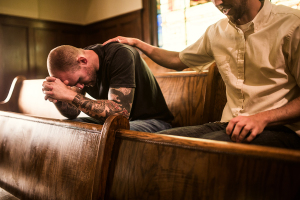What should be the role of women in church? (Part 1)
“I do not permit a woman to teach or to have authority over a man; she must be silent.”
As we have seen, some who consider Phoebe to be a deaconess do not believe that this office constituted a position of leadership in the apostolic church. They affirm the formal role of deaconesses as servants, but not as leaders. Three passages relate to this larger question of women in church leadership. We will consider each briefly.
“I also want women to dress modestly, with decency and propriety, not with braided hair or gold or pearls or expensive clothes, but with good deeds, appropriate for women who profess to worship God. A woman should learn in quietness and full submission. I do not permit a woman to teach or to have authority over a man; she must be silent. For Adam was formed first, then Eve. And Adam was not the one deceived; it was the woman who was deceived and became a sinner. But women will be saved through childbearing — if they continue in faith, love and holiness with propriety” (1 Timothy 2:9-15, NIV).
Here Paul clearly forbids “a woman to teach or to have authority over a man; she must be silent” (v. 12). If this injunction is to be interpreted without qualifications, it certainly prohibits a woman from assuming a leadership role such as deacon in our church. But it also forbids women to serve as a trustee, lead a committee, teach a class where men are present, or perhaps lead musically in worship where men participate. Some churches do in fact enforce such prohibitions, though our church has invited women into such roles for years.
Before we assume that we are wrong to engage women in such leadership positions, or that this text prohibits women from serving as deacon leaders, let’s examine the historical context of this passage. The Bible can never mean what it never meant.
Paul is writing Timothy as he pastors the Christian community of Ephesus, on the western coast of Asia Minor. Five questions make clear the context and intended meaning of this passage.
What is the situation behind our text?
The apostle is concerned about issues related to public worship in Ephesus. He speaks to the dress and appearance of women (v. 9), and encourages “good deeds, appropriate for women who profess to worship God” (v. 10). What circumstances in Ephesus could give rise to these concerns?
Remember that the Temple of Diana, one of the Seven Wonders of the Ancient World, was the most prominent institution in Ephesus. Diana was the pagan goddess of fertility. Thousands of prostitutes were employed by the Temple for men to use in their “worship” of this goddess.
Paul’s concern for appearance with “decency and propriety” contrasts with the shameful, immodest dress of these prostitutes. The apostle’s reference to women’s dress is not repeated in his letters to other churches, signifying that he considered the situation in Ephesus to be distinct and worthy of special attention. This fact further illustrates the uniqueness of Paul’s instructions in this text.[20]
What activity does Paul address?
Women must have been speaking in the Ephesian worship services, or Paul would not have addressed this situation (v. 12). In Ephesus Paul wants women to “learn” (v. 11a, a present tense verb translated “continue to learn”) biblical truth, a significant departure from the Jewish norm. But he also wants them to learn “in quietness and full submission” (v. 11b), for they are to “be silent” (v. 12).
Note that the Greek word for “silent” does not require a total ban on speech. For instance, “Such people we command and urge in the Lord Jesus Christ to settle down and earn the bread they eat” (2 Thes. 3:12, where “settle down” is the same word as “silent” in our text). We are all commanded to live “quiet lives in all godliness and holiness” (1 Timothy 2:2). Paul’s word (hesuchia) does not only mean “do not speak,” but also “be still” or “be receptive.” If the apostle wanted to silence women completely, he would have used sigao. And note that “be submissive” can relate to the message which is being taught, not necessarily the person who is teaching. [21]
It seems clear that Paul wanted the Ephesian women not to disrupt the worship services in which they participated, but to listen receptively to what was being taught. Given the role of temple prostitutes in leading “worship” in that city, it is no surprise that the apostle would do all he could to help Ephesian Christians avoid any public identification of their worship with such immorality.
Who are the “man” and “woman” in our text?
These Greek words can easily be rendered “husband” and “wife” throughout these verses. Aner (“man” or “husband”) and gyne (“woman” or “wife”) are found in close proximity 54 times in 11 different contexts; each time the terms bear the meanings “husband” and “wife” rather than “man” and “woman.” [22] Paul would likely have used anthropos rather than aner if he meant to speak about man in relation to woman; he could have used arsen (“man”) and thelys (“woman”), as he did in Romans 1:26f.
Thus it seems that Paul here refers to husbands and wives in the context of public worship. And so a wife is not to “have authority over a husband” when they are in public worship together, but must be submissive spiritually (v. 12). [23]
What does it mean for women not to “have authority over a man”?
It may be that Paul warns against women leading in public worship in Ephesus. But an alternative explanation has received attention in recent years. “To have authority over a man” (v. 12) can also be rendered, “to lead into sexual immorality.” [24]
In this reading, Paul does not prohibit women from leading men, but from leading them into sin. Given the temple prostitution rampant in Ephesus, it is understandable that the apostle would be concerned especially with such behavior in that city.
What does it mean that “women will be saved through childbirth”?
Paul closes our text with the assurance that “women will be saved through childbearing — if they continue in faith, love and holiness with propriety” (v. 15). This is one of the most problematic phrases in Scripture, as the following possible interpretations make clear:
- “Saved through childbearing” can refer to physical safety rather than spiritual salvation.
- The phrase can refer to bearing “the” child, i.e., the Messiah (though most scholars dismiss this approach). [25]
- The phrase could mean that mothers are saved socially from engagement in many of the ills of their day by becoming mothers and investing in their families. [26]
- It could be that Paul here refutes the ascetic, antisexual beliefs of some of his opponents who have rejected marriage (cf. 1 Timothy 4:3). [27]
- If “have authority over a man” refers to sexual immorality, “women will be saved through childbearing” can be interpreted, “even if she bears a child in prostitution, she can still be saved through faith, love, and holiness with propriety.”
- And the phrase can be translated, “she will be saved even though she must bear children.” [28]
Whatever the meaning behind this difficult phrase, it is clear that Paul does not here demean women or subordinate them to men. Bearing children is both a physical and a spiritual responsibility.
My position: in the public worship of the Ephesian church, wives were to learn biblical truth from their husbands in quietness and full submission. For them to take a leadership role would have been damaging to their witness in a city filled with temple prostitutes. Thus Paul’s teaching here does not contradict his endorsement of women who “prophesy” in 1 Corinthians 11:5 (to be discussed below). Nor does it prohibit women from serving in leadership in other churches and contexts, including the ministry of deacons.



























